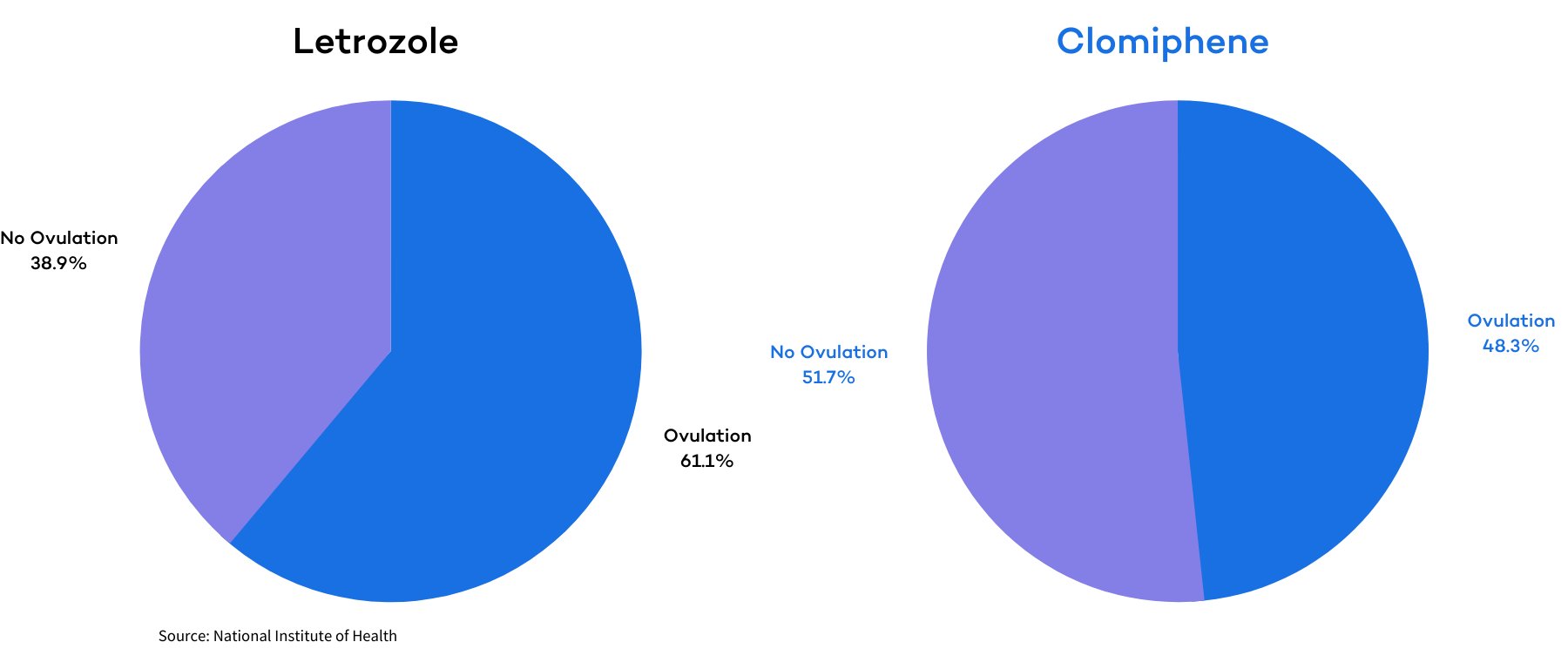Letrozole (Femara) for Fertility

Letrozole, also known by its brand name Femara, is an oral medication used to stimulate egg development and ovulation in female patients undergoing fertility treatment. It’s been used for this purpose since the early 2000s and has quickly become a popular alternative to Clomiphene Citrate (Clomid), which was the standard first-line fertility drug for more than 50 years.
Many fertility specialists now turn to Letrozole because it tends to have fewer side effects, carries a lower risk of multiple pregnancies, and research shows it may lead to higher ovulation and pregnancy rates. It’s also an important option for women who don’t respond to Clomid and are considered “Clomid resistant.”
In this article, we’ll cover what Letrozole is, how it works to improve fertility, who it may be best suited for, and how it’s used within different treatment protocols.
Fast Facts about Letrozole for Fertility
- Drug Class: Letrozole is part of a class of medications called aromatase inhibitors.
- Brand Name & Original Use: Marketed as Femara, it is FDA-approved to treat certain types of breast cancer. Fertility specialists began prescribing it off-label in the early 2000s to stimulate egg development and ovulation.
- Effectiveness for PCOS: Studies suggest Letrozole may be more effective than Clomid for women with Polycystic Ovarian Syndrome (PCOS), improving both ovulation and pregnancy rates .
- How It’s Used: Letrozole can be prescribed alongside timed intercourse, intrauterine insemination (IUI), or in vitro fertilization (IVF).
- Ovulation Rates: Research shows that Letrozole successfully induces ovulation in about 70% of women who otherwise do not ovulate.
- Pregnancy Outcomes: For women who don’t ovulate naturally, Letrozole has been shown to result in pregnancy and live birth in roughly 25% of menstrual cycles.
- Side Effects: Common side effects include headaches, fatigue, and dizziness. Unlike Clomid, Letrozole typically does not cause mood swings or negatively impact the uterine lining or cervical mucus .
What is Letrozole (Femara)
Letrozole is an aromatase inhibitor. This means it lowers estrogen production and is commonly used to stimulate ovulation in women with irregular cycles or anovulation.
It can also boost egg production in women who ovulate regularly but face unexplained infertility. In some cases, Letrozole prompts the development and release of multiple eggs, increasing the chances of conception.
The role of Letrozole in fertility treatment has been studied extensively, with recent research paying particular attention to its effectiveness in treating infertility among women with Polycystic Ovary Syndrome (PCOS).
How does Letrozole Help Improve Fertility?
Letrozole helps to improve fertility in two main ways:
- inducing ovulation
- increasing the number of eggs released each cycle
Letrozole to Induce and Increase Ovulation
Letrozole helps stimulate the ovaries to ovulate by reducing estrogen levels, which in turn signals the body to release higher amounts of follicle-stimulating hormone (FSH). Elevated FSH levels encourage ovarian follicles to develop and mature.
For women with irregular ovulation or Polycystic Ovarian Syndrome (PCOS), this can promote the growth of mature follicles and eggs, making ovulation more likely.
In women who already ovulate regularly, Letrozole can stimulate the development of multiple mature follicles, sometimes leading to the release of more than one egg in a cycle.
Research also shows that Letrozole can benefit women who have not responded to Clomid or are considered “Clomid resistant.” In such cases, Letrozole has been shown to significantly improve both ovulation and live birth rates. .
Letrozole for (Multiple) Egg Development
Letrozole can increase the number of eggs released each cycle by increasing the number of follicles that develop.
In a normal ovulatory cycle, one follicle develops, and one egg is released. In a Letrozole medicated cycle, the amount of FSH a woman produces increases, which can cause multiple follicles to develop and multiple eggs to be released– especially for women who ovulate regularly.
Releasing multiple eggs improves the chances of fertilization and pregnancy. Cycles in which medications are used to stimulate the development of multiple eggs are called controlled ovarian stimulation cycles.
How Letrozole Functions for Fertility
Aromatase is a key enzyme involved in estrogen production. Letrozole (Femara) works as an aromatase inhibitor, reducing the body’s ability to produce estrogen.
When estrogen levels drop, the pituitary gland responds by releasing higher amounts of follicle-stimulating hormone (FSH) and luteinizing hormone (LH). These elevated hormone levels stimulate the ovaries, promoting follicle growth, egg maturation, and ovulation.
Who Should Take Letrozole
If you experience any of the following, you may be a candidate for Letrozole:
- Your periods are very irregular, or you don’t experience periods at all.
- You have been diagnosed with PCOS.
- If your periods are regular but your progesterone levels are low.
- You are experiencing unexplained infertility.
- You are undergoing fertility treatment.
- If you are a male with infertility due to low testosterone.
Letrozole for PCOS Patients
Polycystic Ovarian Syndrome (PCOS) is the most common cause of anovulatory infertility.
90–95% of anovulatory women seeking treatment for infertility have PCOS. In light of this, it makes sense that a large portion of Letrozole research is conducted on patients with Polycystic Ovarian Syndrome.
Though Clomid has historically been used as the first-line fertility treatment for PCOS patients with ovulatory issues, recent research suggests that Letrozole may produce similar, if not better, results for inducing ovulation and producing live births for PCOS patients.
In 2014, the National Institutes of Health (NIH) published a landmark study comparing the effectiveness of Letrozole and Clomid for treating infertility in women with PCOS.
The trial included 374 women treated with Letrozole and 376 women treated with Clomiphene, each taking the medication for five days starting on day three of their cycle, for up to five cycles.
Results showed that 103 women in the Letrozole group (27.5%) achieved a live birth, compared to only 72 women in the Clomiphene group (19.1%). .

The same study also compared ovulation rates between the two medications in women with PCOS.
Letrozole not only produced a higher live birth rate but also a higher cumulative ovulation rate.
Women in the Letrozole group ovulated in 61.7% of cycles (834 out of 1,352), compared with 48.3% of cycles (688 out of 1,425) in the Clomiphene group.

Although Letrozole can sometimes stimulate the development of multiple eggs, this effect is less common in women with PCOS or other ovulatory disorders.
For patients with PCOS, Letrozole offers a unique advantage: mono-ovulation.
Women with PCOS often respond too strongly to gonadotropin medications, which can lead to ovarian hyperstimulation, a condition where the ovaries enlarge and leak fluid into the body.
Research published by the American Society for Reproductive Medicine (ASRM) shows that Letrozole is more likely to promote the release of a single mature egg compared to gonadotropins or Clomid, reducing the risks associated with overstimulation.
For patients with PCOS, Letrozole can stimulate ovulation while maintaining a lower risk of hyperstimulation than other fertility medications.
Letrozole for Unexplained Infertility
Recent studies have shown that Letrozole can be beneficial in treating unexplained infertility.
In one study, investigators compared Clomiphene and Letrozole for their effects on pregnancy rates, miscarriage rates, adverse events, and the number of dominant follicles in women with unexplained infertility.
The findings showed that women treated with Letrozole had a significantly higher clinical pregnancy rate than those treated with Clomiphene. While no meaningful differences were seen in miscarriage or other outcomes.
Researchers concluded that Letrozole is at least as effective as Clomiphene for treating unexplained infertility .
Researchers conducted a randomized controlled trial comparing Letrozole and Clomiphene in 271 women with unexplained infertility. The results showed that more than twice as many women achieved pregnancy with Letrozole (23.1%) compared to Clomiphene (10.7%). .

In addition to higher pregnancy rates, the group treated with Letrozole also showed a statistically significant improvement in endometrial receptivity, measured by endometrial thickness and other indicators.
Researchers concluded that Letrozole has a beneficial effect on the endometrium, which may enhance implantation and pregnancy rates in women with unexplained infertility.
Letrozole and Fertility Treatments
Letrozole is widely used for ovulation induction and is often combined with other fertility treatments. Many fertility specialists now prescribe Letrozole for use in the following approaches:
Timed Intercourse with Letrozole
Timed intercourse is the simplest fertility treatment available. Letrozole is used during timed intercourse cycles to stimulate egg production and to induce ovulation.
During a timed intercourse cycle, doctors use ultrasound and blood work monitoring (or even a home ovulation predictor kit) to monitor follicular development and egg growth.
By monitoring egg development and hormone levels, fertility specialists can pinpoint the window when ovulation occurs and fertilization is most likely. Couples are then advised to have intercourse during this fertile period, maximizing the chances of conception.
Research suggests that Letrozole may be more effective than Clomid for patients with unexplained infertility undergoing timed intercourse.
In one study, women treated with Letrozole had significantly better outcomes, including improved endometrial thickness, stronger follicular response, and a higher clinical pregnancy rate (15.0% versus 11.8% in the Clomid group).
Letrozole is also commonly prescribed with timed intercourse for women whose infertility is related to ovulatory disorders.
Intrauterine Insemination (IUI)
Intrauterine insemination (IUI) is often recommended for couples who have not conceived after several timed intercourse cycles or when the male partner has sperm motility issues. Much like in timed intercourse cycles, Letrozole may be prescribed alongside IUI to stimulate egg growth and better align ovulation with insemination.
During IUI, sperm is collected, concentrated, and placed directly into the uterus. This process increases the number of sperm that reach the uterus and fallopian tubes, improving the chances of fertilization. Letrozole supports this process by stimulating the ovaries to produce multiple eggs, creating more opportunities for fertilization to occur.
As noted earlier, Letrozole can also enhance endometrial receptivity by improving endometrial thickness and blood flow, further supporting implantation and pregnancy success. .
One study examined the impact of endometrial thickness on pregnancy outcomes after IUI and found a strong positive association between the two.
Letrozole’s ability to improve endometrial thickness may help explain why some researchers have observed higher pregnancy rates in patients treated with Letrozole compared to Clomid during IUI cycles.
Gonadotropin medications can also be used alongside IUI, but Letrozole offers a more affordable alternative. Research has shown that Letrozole can promote multifollicular development at a significantly lower cost than gonadotropins.
Multifollicular development is valuable in IUI treatment because it increases the number of eggs available for fertilization, creating more opportunities for conception.
In Vitro Fertilization (IVF)
In Vitro Fertilization (IVF) is the most effective fertility treatment available.
The process typically spans several weeks and involves retrieving eggs from a woman’s ovaries, fertilizing them with sperm in the lab, allowing the embryos to develop for several days (usually three to five), and then transferring one or more embryos into the uterus to continue gestation.
IVF is often combined with different medication protocols, including Letrozole. Fertility specialists may prescribe Letrozole with IVF or mini-IVF to stimulate ovulation and increase egg production.
Letrozole can be particularly valuable for patients who are sensitive to gonadotropin medications or at higher risk of ovarian hyperstimulation. In other cases, it may be prescribed alongside gonadotropins during IVF cycles.
One study compared patients treated with gonadotropins alone to those treated with gonadotropins plus Letrozole. The researchers found that adding Letrozole reduced the amount of gonadotropin medication required, without compromising pregnancy rates. .
Letrozole Protocols and Dosing
Letrozole is commonly found as a 2.5-milligram oral tablet. Fertility doctors dictate when patients should begin taking Femara based on when their period begins.
Generally, letrozole is taken over a period of five consecutive days. The medication is usually started on day 2, 3, 4, or 5 of the female’s cycle and continued until day 6, 7, 8, or 9 (depending on when it was started).
If you are undergoing a timed intercourse cycle, your Femara start date will indicate when you should have sex to increase your chances of getting pregnant.
During a normal 28-day cycle, women ovulate or release an egg on day 14. This marks the beginning of her luteal phase, during which she can become pregnant.
In a Femara (Letrozole) medicated cycle, women ovulate approximately 7-10 days after they begin taking medication. Fertility doctors will start monitoring the patient’s follicle growth after 5-7 days to gauge when she will start ovulating.
If a woman started Femara treatment on day 3 of her cycle, she would likely ovulate between days 10 and 13.
If a woman started Femara treatment on day 5 of her cycle, she would likely ovulate between days 12 and 15.
Because eggs remain viable for only about 12 to 48 hours after ovulation, understanding the timing of the female partner’s cycle is crucial.
To maximize the chances of fertilization, couples are often advised to have intercourse two to three days before ovulation so sperm are already present when the egg is released.
For patients undergoing IUI or IVF, accurately pinpointing ovulation is just as crucial, as it determines the optimal timing for treatment.
Letrozole (Femara) for Fertility: The Bottom Line
Letrozole is an increasingly popular fertility medication thanks to its effectiveness, affordability, and favorable side effect profile compared to older oral drugs like Clomid (Clomiphene) .
It can be used on its own or alongside a variety of fertility treatments and often provides a cost-effective alternative to injectable medications such as gonadotropins.
As with any fertility medication, it’s important to consult with your doctor to determine whether Letrozole is the right option for your specific situation.



